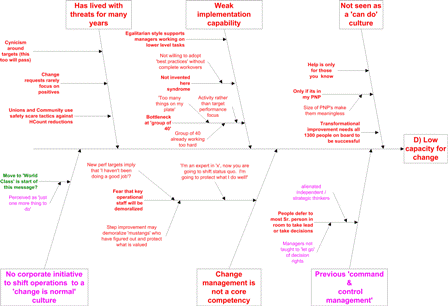Skip Reardon at Six Disciplines brings to light a McKinsey survey that sheds new light on what drives a successful transformation in organizational performance. Respondents reckoned that their companies were conspicuously more effective than others at raising expectations about future performance, addressing short-term performance, engaging people at all levels of the organization, including a clear and coordinated program design, and making change visible –through, say, new IT tools or physical surroundings. McKinsey also claims survey results show that emotions play a leading role in a performance transformation.
There is a strong link between expectations and emotions. (See research below carried out at the University of Colorado).
I would claim that the right measure for execution success is having met expectations. If you agree with that, then you can see how important emotions are to success. The dark side of this equation is that missed expectations can lead to negative emotions that lead to poor execution. Sounds too theoretical, too academic? If you can’t find a way to improve management of expectations then execution will continue to be perceived as failure on a regular basis.
There are limitless types of performance expectations. Participants in a major change program might all agree on a high-level outcome for organization change /transformation. Even with that agreement performance expectations will vary widely in two unique areas.
- How transformation execution should be optimized during execution and
- What to optimize around for the transformation results achieved from execution
These two areas yield very different types of expectations. Expectations of how execution will be carried out during execution and what the result will be from execution lead transformation team members to very different types of behaviors.
When behaviors are conflicting between team members engaged in achieving the same transformation outcome, sparks fly, failure is the norm and careers can be lost.
Expectations of Performance During Execution
During transformation execution, participants and those funding it can differ wildly on how to optimize. That is, whether the execution of the transformation is proceeding;
- too quickly or slowly (optimized for speed),
- with enough concern for risk factors (optimized for certainty of success),
- in a way that provides visible, measurable progress (optimized to provide clarity and measurability),
- to reduce expenditure of financial and fixed resources, and management time) (optimized for best use of resources/ low cost)
Conflict During Execution
A number of these from the list above are types of conflicting expectations. One group might be expecting to see the transformation occur as quickly as possible and another group expects it to occurs with as much organizational buy-in as possible. These two “Qualities of Execution” are usually conflicting. Change teams will execute in a way that optimizes one or more of these Qualities of Execution. Someone optimizing execution for speed will execute the same project quite differently than someone who is optimizing for certainty. There are very different behaviors involved in executing for speed versus for certainty. Which is the right behavior for the transformation manager? Someone who crosses all the t’s and dot’s all the i’s (e.g. a process/ details oriented behavior), or a Captain Kirk, a transformation manager who cuts corners, makes bold moves, “goes where no man has gone before”. Such variations in behavior during execution of a major change program lead to conflict and dysfunctional behavior among team members.
Expectations of Performance From Execution:
These same participants in the transformation have their own expectations from execution. Sure, they may all absolutely sign-on for the highest level change outcome, but during transformation, participants and those funding it can differ wildly on what to optimize around. That is, whether the transformation will result in;
- the greatest size of change possible (optimize for the greatest amount of transformation change)
- the change / transformation be long lasting (optimized for sustainability)
- an exceptionally high level of commitment to the change / transformation (optimized for buy-in)
- the change /transformation having the broadest impact (optimized for reach)
Conflict From Execution
A number of these from the list above lead to different and sometimes conflicting expectations. For example, while working on initiatives to achieve an outcome, you might have team members working to maximize the amount of performance change. At the same time you might have other team members working on the same outcome but in a way that would achieve it at the lowest cost. The team behaviors by both groups would be quite different. You can imagine the type of conflict that can occur when there are different expectations for what to optimize on from execution.
Emotions and Performance are Impacted When Expectations Are Not Being Met
When expectations aren’t being met, emotions start to erupt. The higher a team member’s expectations (e.g. Gee, I really thought we were on the same page here!) the bigger the emotional impact. According to McKinsey, while respondents reported negative and positive moods in roughly equal proportions, more of the top performers reported experiencing the positive emotions – especially focus and enthusiasm. It doesn’t take much to figure out that those two emotions can have a major impact on successful execution of any organizational change and transformation.
Here is some research on the connection between emotions and expectations. It is somewhat obvious, but nonetheless supports the research by McKinsey and my contention that you have to manage expectations for successful execution.
Management of Expectation can be accomplished using the “Qualities of Execution” approach.
Olympians’ Emotions Greatly Affected By Prior Expectations Says CU Professor from PhysOrg.com Olympians’ expectations going into the games often affect how thrilling their victories or agonizing their defeats will be, according to a University of Colorado at Boulder professor.


![Better Execution: Stick to Your Strategy? [Part 2]](https://www.strategy2execution.com/wp-content/uploads/2015/11/glacialstrategy3.jpg)


Leave A Comment